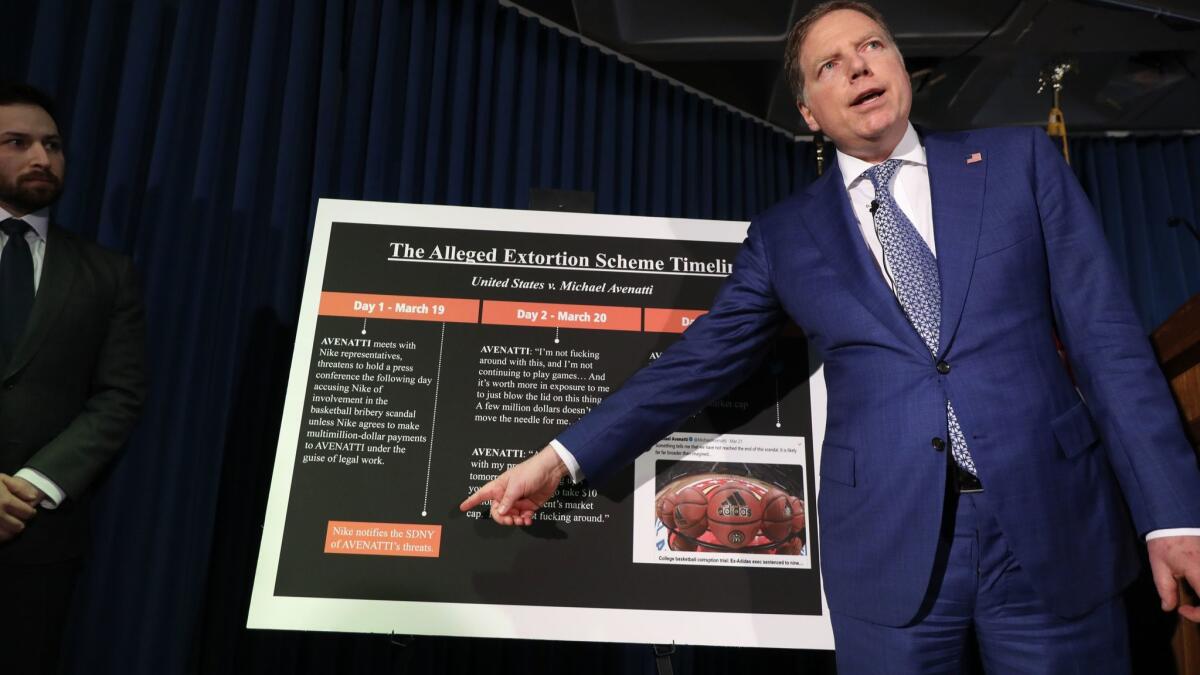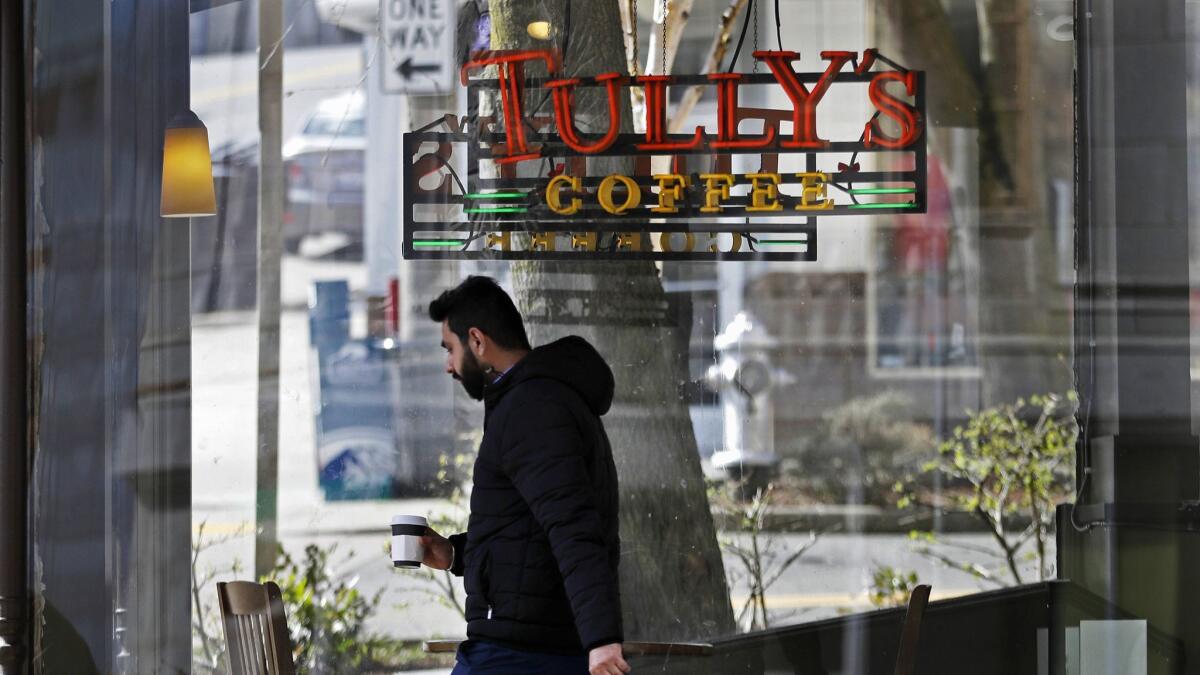Here are key takeaways from the criminal complaints against Michael Avenatti

Los Angeles attorney Michael Avenatti was arrested on federal charges of embezzling money from a client, defrauding a bank and attempting to extort millions of dollars from Nike in separate criminal cases filed in New York and Santa Ana.
It was a bad day for Michael Avenatti, the combative attorney who rose to fame by representing porn star Stormy Daniels and sparring with President Trump. In quick succession, federal prosecutors in New York and California announced a slate of criminal charges Monday against the Los Angeles lawyer. He was arrested in New York City.
Here are key takeaways from both complaints against Avenatti, who said Monday night that he expects to be fully exonerated.
The case brought by prosecutors in New York had no shortage of salacious details, including a famous co-conspirator, salty language and allegations of wrongdoing in college basketball at the height of the March Madness frenzy.
The following details were drawn from the complaint released by the U.S. Attorney’s Office for the Southern District of New York.
1. Avenatti was looking to capitalize on an existing controversy
College basketball scandals regarding the recruitment of top players are frequent. In one recent case, an Adidas executive and two other recruiting insiders were sentenced to nine months in prison for facilitating illegal payments to high school players and their families, in hopes of swaying their choice of schools and shoe sponsors.
On March 19, Avenatti met with Nike lawyers and told them that his client, a coach with the Amateur Athletic Union, had evidence that Nike employees made payments to high school stars and their families, according to the complaint.
The client referenced in the complaint is Gary Franklin Sr. of the California Supreme team, according to two people familiar with the matter who spoke on the condition they not be identified. Franklin, the executive director and head coach of the team, didn’t respond to multiple messages.
The program developed a national reputation for producing top-flight players. Alumni include Deandre Ayton, the top overall pick in the NBA draft by the Phoenix Suns last year, former UCLA star Aaron Holiday and ex-USC standout De’Anthony Melton. The complaint doesn’t accuse Franklin or any players of misconduct.
Nike previously sponsored the team; it’s unclear when or why the relationship ended.
Avenatti threatened to hold a news conference about the accusations, looking to maximize financial damage to the company by timing the announcement around the start of the NCAA men’s basketball tournament and Nike’s quarterly earnings call.
Tuesday morning on Twitter, Avenatti posted fresh attacks on Nike, challenging the company’s statement that it was cooperating with investigators.
“Unless you count lying in response to subpoenas and withholding documents as ‘cooperating,’” he wrote. “They are trying to divert attention from their own crimes.”
2. He had an alleged co-conspirator — and it’s a familiar figure
The complaint details multiple interactions between Avenatti and Nike, and there is almost always another person present — an unnamed “co-conspirator” who is “known for representation of celebrity and public figure clients.”
Avenatti and his cohort connected with Nike attorneys multiple times last week, including two in-person meetings.
The “unindicted co-conspirator” has been identified as celebrity attorney Mark Geragos. The Los Angeles attorney has represented famous clients, including “Empire” actor Jussie Smollett and singer Chris Brown.
Geragos’ lawyer Benjamin Brafman said he hoped prosecutors “will conclude that Mr. Geragos did not violate the law in any manner.”

3. Avenatti proposed various sums for his silence
The allegation that Nike made payments to high school basketball players could wreck its finances, Avenatti claimed, estimating the scandal could take $10 billion off the company’s market capitalization.
Nike could avoid that fate, Avenatti said, if the company paid $1.5 million to his client and then agreed to hire Avenatti and the co-conspirator to do an internal investigation. That probe, Avenatti said, would cost between $15 million to $25 million.
When attorneys for Nike balked at retaining Avenatti, he proposed another plan: a $22.5-million total payment.
“If [Nike] wants to have one confidential settlement and we’re done, they can buy that for 22 and a half million dollars and we’re done. … Full confidentiality, we ride off into the sunset,” Avenatti said, according to the complaint. The meeting was audio- and video-recorded by Nike’s lawyers.
4. His language was … colorful
Known for his brash media persona, Avenatti was similarly bombastic when dealing with Nike’s attorneys. He repeatedly used profane language.
“I’m not [expletive] around with this, and I’m not continuing to play games. … You guys know enough now to know you have a serious problem,” Avenatti said in a phone call on March 20, according to the complaint.
The next day, when a Nike lawyer said he had never been paid more than $10 million for an internal investigation, as Avenatti sought, the Los Angeles attorney asked him if he’d ever “held the balls of the client in your hand where you could take five or six billion dollars market cap off of them?”
Avenatti also wanted a resolution quickly. He said if a deal wasn’t struck by Monday, “we are done. I don’t want to hear about somebody on a bike trip. I don’t want to hear … that somebody’s grandmother passed away. … None of it is going to go anywhere unless somebody was killed in a plane crash, it’s going zero, no place with me.”
5. His Twitter feed offered clues
On March 21, Avenatti tweeted a link to a story about the Adidas executive being sentenced to prison and teased that more was to come. “Something tells me that we have not reached the end of this scandal. It is far far broader than imagined ...”
Michael Avenatti arrested and charged with embezzlement and attempt to extort Nike »
U.S. Attorney Geoff Berman said that tweet was intended to send a message to Nike executives.
On Monday, Avenatti was far more explicit, writing that he would hold a news conference on Tuesday to “disclose a major high school/college basketball scandal perpetrated by Nike.” Less than an hour later, federal prosecutors in New York announced that Avenatti was under arrest.
The criminal complaint filed by federal prosecutors in Santa Ana charges Avenatti with two felonies: bank fraud and wire fraud.
But the Internal Revenue Service suspects he committed numerous other crimes still under investigation: tax evasion, money laundering, conspiracy and bankruptcy fraud, among others, court papers show.
1. Avenatti is accused of giving phony tax returns to a bank
In 2014, Avenatti obtained $4.1 million in loans from Peoples Bank in Mississippi for his law firm, Eagan Avenatti, and his failing coffee business, Global Baristas, which operated Tully’s outlets in Washington state and California.
To secure the loans, Avenatti gave the bank phony personal tax returns for 2011, 2012 and 2013, claiming he’d earned a total of more than $14 million, prosecutors say.
In reality, Avenatti never filed any personal tax returns for those three years, according to a sworn statement by Remoun Karlous, a criminal-investigation agent at the IRS.

2. Avenatti was in the habit of dodging taxes, the IRS says
Avenatti still owes the IRS more than $850,000 for unpaid personal taxes from 2009 and 2010, according to the government. And from 2011 to 2017, he filed no personal tax returns, the IRS says.
A similar pattern emerged in the businesses he controlled.
Eagan Avenatti did not file tax returns for 2013 through 2017, even as nearly $138 million was deposited into its bank accounts, according to the IRS. Avenatti was the firm’s managing partner and majority owner, court papers show.
Avenatti & Associates, a company that he owns entirely, filed no tax returns for the years 2011 through 2017 — while collecting nearly $38 million in bank deposits, including almost $24 million from Eagan Avenatti, according to the government.
Avenatti personally received $8.4 million from the law firm and Avenatti & Associates from 2011 to 2017, using the money to live lavishly, Karlous alleged in his sworn statement.
3. Avenatti is accused of stealing money from a client
Avenatti is charged with wire fraud for taking $1.6 million in settlement proceeds that he was entrusted to hold for a client, Gregory Barela of Irvine, in an intellectual-property dispute.
In January 2018, Avenatti had the money wired to a bank account that he controlled, but never told Barela; Avenatti then used it all for personal expenses, prosecutors say.
“To this day, nearly 15 months later, Mr. Avenatti’s client is still waiting for the bulk of his settlement, even after he hired another attorney who discovered that Mr. Avenatti had the funds all along,” U.S. Attorney Nick Hanna said Monday at a news conference in Los Angeles.
Barela attorney Steven E. Bledsoe said he’d never heard of a lawyer falsifying legal documents to steal from a client, as prosecutors alleged.
“This is a very sad situation for all involved,” he said.
4. Avenatti is accused of covering up his crimes
Avenatti lied to the IRS when confronted with evidence that Eagan Avenatti and his coffee business had withheld millions of dollars from employees’ paychecks for taxes, but failed to transmit the money to the government, prosecutors say.
He also switched the names of corporate entities and opened secret bank accounts to block attempts by the IRS to seize money to cover the taxes, according to the government.
5. Stay tuned for more charges
In court papers, the IRS listed various crimes it suspects Avenatti committed beyond the charges unsealed on Monday.
One was his obstruction of IRS efforts to collect payroll taxes from his coffee business. Another was potential tax crimes involving his law firm.
The alleged theft from Barela could also yield money laundering charges, the IRS says. And his failure to report that income in Eagan Avenatti’s bankruptcy proceedings, according to the IRS, could result in a bankruptcy fraud charge.
More to Read
Get the L.A. Times Politics newsletter
Deeply reported insights into legislation, politics and policy from Sacramento, Washington and beyond. In your inbox three times per week.
You may occasionally receive promotional content from the Los Angeles Times.













